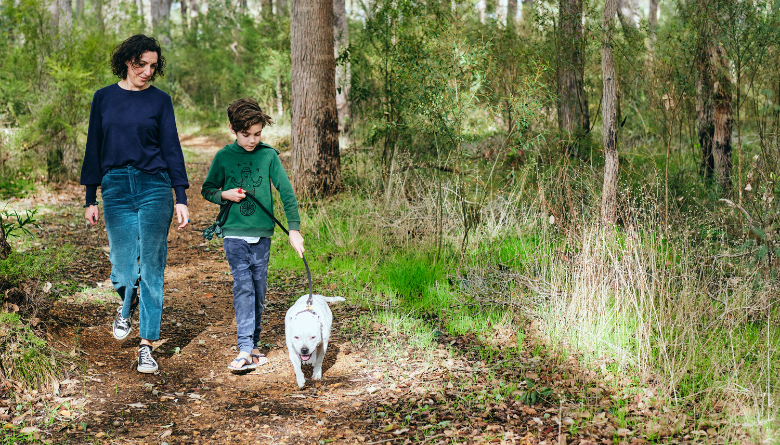
With the warmer weather approaching, our Ranger Services team would like to remind residents to remain vigilant as snake activity increases across the region.
Western Australia is home to several venomous snake species including dugites, tiger snakes and western brown snakes, all of which are commonly found here in the Margaret River region.
If you encounter a snake, it is important to avoid approaching it and to give it plenty of space.Dogs are also particularly vulnerable to snake bites due to their curious nature and tendency to investigate undergrowth where snakes shelter.
Here are some tips to help you protect your dog from snake bites.
How to protect your dog from snake bites
- Keep your yard tidy – remove potential snake habitats such as long grass, woodpiles, sheet iron, and building materials
- Walk dogs on leads in bushland and grassed areas, particularly during dawn and dusk when snakes are most active
- Avoid long grass and undergrowth during walks
- Keep dogs away from rock walls, logs, and dense vegetation where snakes may be sheltering
- Maintain clear sightlines in your garden by trimming vegetation
- Secure chicken coops and pet food to avoid attracting rodents, which in turn attract snakes
- Consider snake avoidance training for your dog through qualified trainers
Signs that your dog has been bitten
Snake bites can be life-threatening so keep an eye out for these symptoms:- Sudden weakness or collapse
- Vomiting
- Dilated pupils
- Trembling or twitching
- Loss of bladder and bowel control
- Difficulty breathing
- Paralysis, particularly of the hind legs
- Blood in urine
Symptoms may not appear immediately and can take several hours to develop, however time is critical so if you suspect your dog has been bitten make sure you follow the below steps.
What to do if your dog has been bitten
- Keep them calm and still – movement increases venom spread through the bloodstream
- Carry your dog to the car if possible
- Seek immediate veterinary attention – call ahead to alert the clinic that you’re coming to ensure they have antivenom in stock
- Do not wash the bite area – venom traces help vets identify the snake species
- Do not apply a tourniquet – this can cause more harm as it can cut off circulation and destroy tissue
- If you see the snake and it is safe to do so, try to identify it for your veterinarian (such as taking a photo or noting the pattern and colouring)
Local emergency veterinary contacts
Margaret River and Augusta Vets
- Phone 08 9757 2163 during opening hours
- Phone 0447 906 671 after hours until 10pm
Cape Creatures Veterinary Hospital
- Phone 08 9757 9700
return to news and public notices
Back to top

